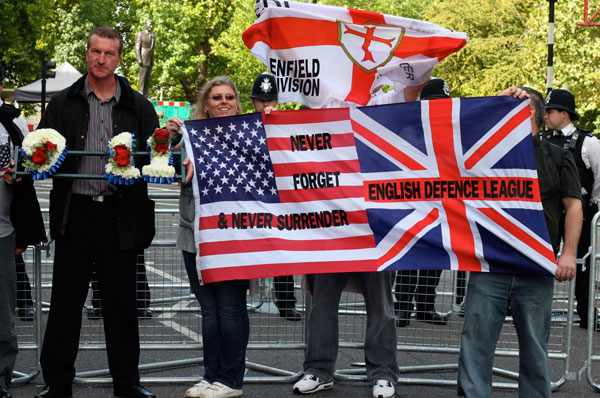
BY SAM SPOKONY | As I waited in line outside St. Paul’s Cathedral in London on Sunday morning, I realized that, although I’ve always lived in New York, never once had I attended a 9/11-anniversary ceremony. And, ten years later, I knew I wasn’t attending the ceremony in London to grieve — it was curiosity more than anything else that drew me in.
What I wanted to learn over the course of the day was what affects the ubiquitous aftershocks of Manhattan’s darkest moment might still have on one of our closest international allies (not to mention a nation that lost 67 of its own citizens in the attacks). What I actually did learn was that, even amid the genuine unity that arises in moments of great symbolic gravity, the rifts opened between Islam and the West after 9/11 still exist far from the Middle East — and, at least in London, the voices of extremists on both sides are still virulent enough to, if only for a moment, cut through the feelings of quiet and dignified remembrance we might seek.
The emotional service at St. Paul’s came after a private gathering at the 9/11 Memorial Garden in Grosvenor Square, and allowed locals and tourists to join in a spirit of brotherhood with high ranking officials, many of whom shared similar pain. The American flag, as well as that of the U.S. Marines, stood squarely next to the Union Jack throughout the proceedings. A Member of Parliament spoke, but no one worried about electioneering by opportunistic politicians, then or later. It seemed as if the only thing on anyone’s mind was what I heard from Russell Pearson, a British fire officer.
“It think it goes back a long way, to when there was a significant join between our two countries,” Pearson said. “We feel very protective of the United States, so we’ve got to make sure those bonds are still in place. And, thinking back to 9/11, it still seems as if any attack on that country is an attack on the entire civilized world.”
But it became increasingly difficult to remember that sentiment as I stood outside Grosvenor Square several hours later. Whole blocks had been cordoned off to contain the presence of two rival groups who were demonstrating en masse — Muslims Against Crusaders, a radical Islamic organization, and the English Defence League, a growing team of far-right nationalists that is fiercely opposed to the continuation of the U.K.’s multicultural society.
The protests never erupted into full-scale violence (although I read that two men were stabbed later that night in a related brawl), but the ease with which two of the most maniacal groups in existence took virtual control of a central city district was disturbing. And they weren’t doing it from scratch; both sides held 9/11 up proudly in support of their own cause. The M.A.C. waved signs that celebrated the attacks, mocked the victims and promoted worldwide jihad. The E.D.L. carried elaborate memorial wreaths and proclaimed to be sympathetic with Americans everywhere — but it didn’t take an ambassador to know that they were only chanting “USA” in order to start a fight.
“We’re standin’ up for you Yanks,” one of them told me.
“Standin’ up fo’ everyone in the free world!” chimed in another.
I know I really should not have been shocked by any of this. But ten years after the fact, on what was really my first observance of a 9/11 anniversary, I guess I just expected something else.



































